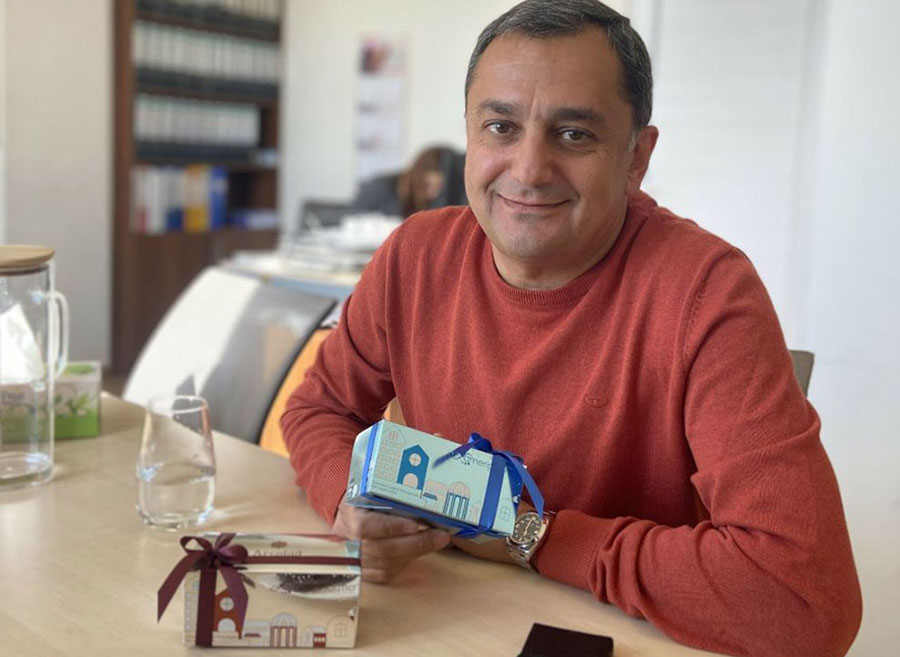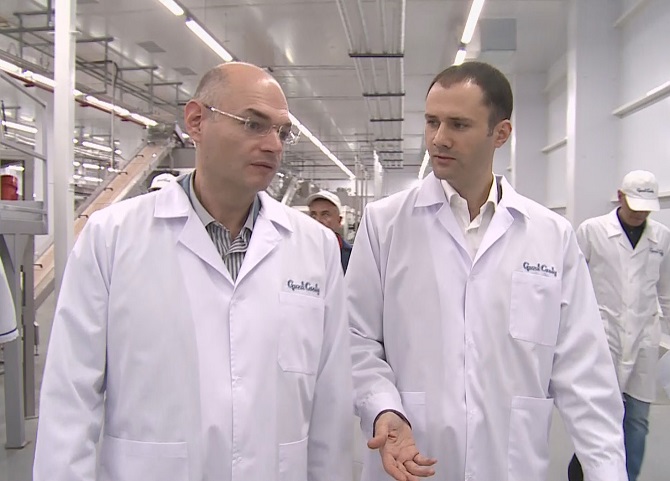The irresistible aroma of pure dark chocolate swept over Emil Harutyunyan during a visit to a trade show of bread and pastry-manufacturing equipment in France. He had come from Armenia to buy machines for making French bread and croissants. But the smell was so sweet and the chocolate-making process so captivating that he changed his plans.
At the time, in the early 2000s, high-quality chocolate was unavailable in Armenia. The country only had Russian-made compound chocolate, a combination of cocoa, sweetener, and vegetable fat that’s cheaper than the real thing. So, in 2004, Harutyunyan started Arcolad, a small producer of European-style chocolate.
The first five years were challenging. “It took some time for people to get used to high-quality chocolate,” says Margarita Harutyunyan, Arcolad’s marketing and external relations manager (and the founder’s wife).
“They also weren’t used to the European-style ‘ballotins,’ the boxes our chocolates come in,” she adds. “For Armenians, the large, flat, Soviet-style chocolate boxes were considered fancy. They had to get used to the new design. But then chocolate lovers began to understand that our chocolate was the real thing, that it was fresh and without additives.”
Arcolad imports its equipment from Germany, Belgium and Italy and its packaging materials from Germany and Switzerland. Most of the raw materials for the chocolate come from Belgium. The marzipan comes from Germany and the walnuts and dried fruits (apricots, peaches and plums) are grown in Armenia.
As demand grew, Arcolad (a combination of Armenia and shocolad) needed to expand production. In 2021, the company took a loan of 40 million Armenian drams (nearly €40 000 by today’s exchange rate) from a local bank that had, in turn, received financing from the Armenian Central Bank, through a European Investment Bank credit line specifically intended for small and medium-sized firms.
The chocolatier later took two other loans under that credit line, in 2021 and 2023.
“After a disastrous year in 2020, with the pandemic and the war in Nagorno-Karabakh, we needed something to keep us going,” says Margarita Harutyunyan. “The loans were important to us, to ensure our stability. We overcame the financial difficulties we faced at that moment and we moved on.”
Now the company exports chocolate to the United States and Europe, and recently opened a US distribution subsidiary that’s expected to begin operating in 2024.
Support for small firms
The European Investment Bank has extended four credit lines to the Central Bank of Armenia since 2014. The central bank converts the funds to Armenian drams and lends them on to local banks, which in turn lend the proceeds on to microbusinesses and small and medium-sized enterprises.
The most recent credit line, the €70 million Armenian Economic Resilience Facility, was signed with the central bank in December 2022, and €28 million has already been disbursed. The financing is in the process of being allocated to 12 commercial financial institutions supporting a variety of projects.
Like the first three loans (which totalled €150 million), this credit line is being implemented by the German-Armenian Fund, a department of the Central Bank of Armenia. It will support 1 200 firms and sustain 1 500 jobs.
The Central Bank and the local banks are expected to devote 45% of the total to projects outside the capital, Yerevan, while 40% will be allocated to green projects and 30% to the inclusion of women in business.
“We work with intermediaries like the Central Bank of Armenia to channel more green finance to small and medium-sized enterprises,” says Daniela Diedrich-Ristic, a senior climate-change specialist at the European Investment Bank.
“There is still limited awareness among borrowers, both commercial banks and small and medium firm, which poses a challenge to the growth of green investments. There are some low-hanging fruits, which are fairly easy for banks to identify, such as renewable energy, including wind and solar, energy efficiency in buildings or industry, or electric cars,” she adds.
“We are aiming to expand the scope across the full spectrum of our climate and environmental sustainability definitions, for example in the agricultural sector, which is quite important for Armenia. Technical assistance to help banks identify the right projects and build competencies in green financing has proven to be a key element in reaching their green targets.”
In addition to the loan, the central bank and the local banks benefit from €499 000 in technical assistance. This is financed by the Eastern Partnership Technical Assistance Trust Fund and by Greening Financial Systems. With this financing, European Investment Bank Advisory will help the banks target businesses that pursue green projects, further social inclusion, and pursue digitalisation.
The advisory programme will support the identification and structuring of projects for female entrepreneurship which meet the 2X Challenge criteria.
“We will help the banks identify and prioritise investment in companies that are led by women, or have a large female workforce, or that produce services for women,” says Michael Steidl, a technical assistance expert at the European Investment Bank.
Arcolad certainly fits the loan criteria. About 70% of its employees are women and more than half of management positions are filled by women. Thanks to the financing, the company has grown to 48 employees and is building a new factory that will enable it to multiply its production by a factor of ten.
“The new place, which we hope to complete in the spring, will be located outside Yerevan,” says Margarita Harutyunyan. “We’ll be able to hire more women from the surrounding small towns.”
Change is in the air
The European Investment Bank has been working with the Central Bank of Armenia since 2014.
“The Central Bank of Armenia and the German-Armenian Fund are our trusted partners. They have a lot of experience and are very effective in implementing financing operations with international financial institutions,” says Tamar Andguladze, a loan officer at the European Investment Bank.
The economic situation in Armenia is evolving. “The private sector has grown quite significantly in the past ten years,” Andguladze says.
“The country is now navigating a more challenging external environment, with Russia playing a much-diminished role as its security guarantor,” she says. “The government’s 2021-2026 reform programme is expected to support longer-term growth, shifting away from Russia and rebalancing its exports towards other countries.”
With support from the European Commission, the European Investment Bank decided to step up its activities in Armenia and explore new opportunities, with a view of improving access to finance to help develop the country’s private sector.
The European Investment Bank approached several local Armenian banks and microfinance institutions to explore the possibility of direct cooperation, and the response was very enthusiastic. The Bank is now putting together a new funded facility to provide credit lines directly to Armenian banks.
“The local banks were very excited and open to working directly with us,” Andguladze says. “The central bank also welcomed the move. It sends a very positive signal to the international community, that the European Investment Bank is here, and that its main mission is to support the development of the Armenian private sector.”




















































